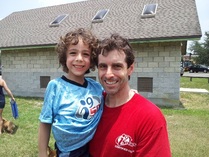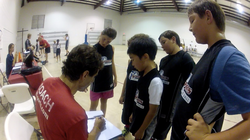In fall 2010, when Phoenix was a few months beyond his third birthday, I decided to sign him up for a soccer league. Outside of taking a soccer gym class in college and kicking a soccer ball around a few times with my older son, Scott, I had no experience playing soccer and had watched it only sparingly on TV. But I was willing to explore the soccer option because I wanted to introduce Phoenix to the world of organized sports and some of his pre-k classmates wanted to give soccer a try.
I was delighted to discover that Phoenix’s first soccer coach, the father of one of his classmates, had an engaging personality and played competitively at a high level. I sat back and closely watched as he did a masterful job organizing the practices that first season. In spring 2011, I offered to help the same coach herd the cats, otherwise known as toddler soccer players who spent as much time gazing at clouds and airplanes as they did the ball and goal. I enjoyed the process, quickly growing more comfortable with the sport and working with the kids.
The following season, Phoenix regrettably had a different coach. This one was far less invested, animated, or knowledgeable than the first coach. Again I offered to help, but I was frustrated by the coach’s nonchalant, disorganized style. The kids were not being challenged and spent most of their time just standing around tugging on each other’s shorts and teasing one another. I navigated the politics of being the helper as best I could. Eventually, though, I tactfully asserted myself to get the kids to do drills that required them to move and develop basic skills. I told myself then that I should not leave these matters to chance in future seasons. I’ve coached all but one of Phoenix’s athletic teams since (a back surgery got in the way once) to guarantee that an energetic, invested person would be in charge.
Ironically, a few years before my youth coaching career began, I interviewed 55 male youth workers in Florida who were working with kids for pay or as volunteers in various positions (e.g., coaches, teachers, youth ministers, Boys & Girls Club staff). When I became a youth coach I was informally extending my academic experience. Those dedicated men I interviewed reinforced my desire to make a difference in young people’s lives.
All of the attributes I describe in my first blog as being key features to fathering in the health and fitness areas (facilitator, attentive, time manager, healthy model, energizing, ritual innovator, inspirational, nurturing, and generative) have shaped my experience as Phoenix’s dad-coach. Those of you who have taken on this responsibility know quite well that the experience is often difficult yet rewarding. Unfortunately, for coaches like myself who work with kids in entry level participation leagues, it is challenging to motivate kids with diverse personalities and skill sets to forge a team mentality.
I was delighted to discover that Phoenix’s first soccer coach, the father of one of his classmates, had an engaging personality and played competitively at a high level. I sat back and closely watched as he did a masterful job organizing the practices that first season. In spring 2011, I offered to help the same coach herd the cats, otherwise known as toddler soccer players who spent as much time gazing at clouds and airplanes as they did the ball and goal. I enjoyed the process, quickly growing more comfortable with the sport and working with the kids.
The following season, Phoenix regrettably had a different coach. This one was far less invested, animated, or knowledgeable than the first coach. Again I offered to help, but I was frustrated by the coach’s nonchalant, disorganized style. The kids were not being challenged and spent most of their time just standing around tugging on each other’s shorts and teasing one another. I navigated the politics of being the helper as best I could. Eventually, though, I tactfully asserted myself to get the kids to do drills that required them to move and develop basic skills. I told myself then that I should not leave these matters to chance in future seasons. I’ve coached all but one of Phoenix’s athletic teams since (a back surgery got in the way once) to guarantee that an energetic, invested person would be in charge.
Ironically, a few years before my youth coaching career began, I interviewed 55 male youth workers in Florida who were working with kids for pay or as volunteers in various positions (e.g., coaches, teachers, youth ministers, Boys & Girls Club staff). When I became a youth coach I was informally extending my academic experience. Those dedicated men I interviewed reinforced my desire to make a difference in young people’s lives.
All of the attributes I describe in my first blog as being key features to fathering in the health and fitness areas (facilitator, attentive, time manager, healthy model, energizing, ritual innovator, inspirational, nurturing, and generative) have shaped my experience as Phoenix’s dad-coach. Those of you who have taken on this responsibility know quite well that the experience is often difficult yet rewarding. Unfortunately, for coaches like myself who work with kids in entry level participation leagues, it is challenging to motivate kids with diverse personalities and skill sets to forge a team mentality.

I gain perhaps the most satisfaction out of inspiring Phoenix to be a leader on his team even though he is typically one of the younger (or the youngest) players. Because we spend a lot of time together, and I have flexible work hours, we have ample time for planning and practice sessions prior to a season and a game. Consequently, on our basketball and football teams especially, I talk to Phoenix extensively on and off the court or field about my coaching philosophy, the value of drills, specific plays, and strategies for building team chemistry. As a son-player he has learned that he can help build team spirit in unique ways.
Our arrangement allows Phoenix to enter the first and often subsequent practices with a much clearer sense of my expectations. This provides him with athletic capital that is built on both his physical motor skills and coordination as well as my knowledge and motivation to teach him the details of a specific sport.
The thoughts of Jessica Skolnikoff and Robert Engvall, professors at Roger Williams University in Rhode Island, are relevant here. In their recent book, Young Athletes, Couch Potatoes, and Helicopter Parents: The Productivity of Play, they discuss how dad-coaches in youth sports affect their child’s chances to succeed in this arena. They extend Malcolm Gladwell’s conclusions in his 2008 best seller Outliers that those who are truly standouts in a field develop their talent through the connections they often make at a young age, the increased practice time they get, and the specialized coaching they receive. Skolniknoff and Engvall agree with Gladwell’s basic idea, but they encourage us to understand that many kids who are labeled “standouts” benefit from an initial and subtle selection process that implicates them as the “chosen ones.” These kids are given unique opportunities and tend to be given greater latitude to fail as they gain experience.
Our arrangement allows Phoenix to enter the first and often subsequent practices with a much clearer sense of my expectations. This provides him with athletic capital that is built on both his physical motor skills and coordination as well as my knowledge and motivation to teach him the details of a specific sport.
The thoughts of Jessica Skolnikoff and Robert Engvall, professors at Roger Williams University in Rhode Island, are relevant here. In their recent book, Young Athletes, Couch Potatoes, and Helicopter Parents: The Productivity of Play, they discuss how dad-coaches in youth sports affect their child’s chances to succeed in this arena. They extend Malcolm Gladwell’s conclusions in his 2008 best seller Outliers that those who are truly standouts in a field develop their talent through the connections they often make at a young age, the increased practice time they get, and the specialized coaching they receive. Skolniknoff and Engvall agree with Gladwell’s basic idea, but they encourage us to understand that many kids who are labeled “standouts” benefit from an initial and subtle selection process that implicates them as the “chosen ones.” These kids are given unique opportunities and tend to be given greater latitude to fail as they gain experience.

This new book helps me to reflect as a dad-coach on the overlap between family and youth sports. In particular, it prompts me to assess my own practice of incorporating Phoenix as a point guard and quarterback on our teams. Even as I write this piece, our joint story and my self-reflections continue to unfold because we—the Cobras—will soon play our last regular season game, and then the championship game, without our top play maker and other key players who will be on vacation. As a result, even more responsibility may fall on Phoenix’s young shoulders to run the team and for me to find ways to help him and our team succeed while managing the politics of being a dad-coach.

 RSS Feed
RSS Feed
